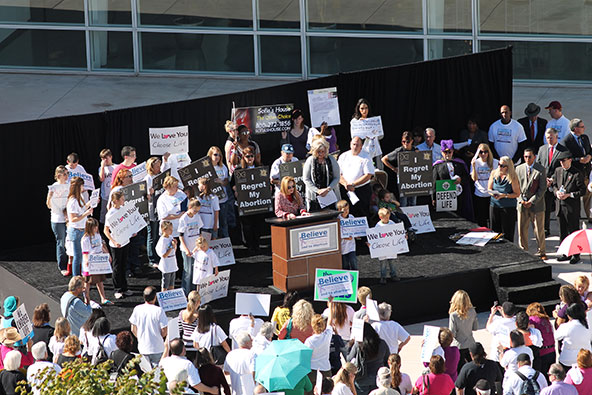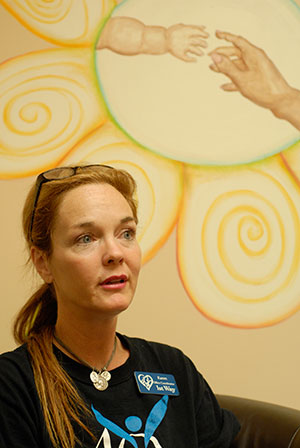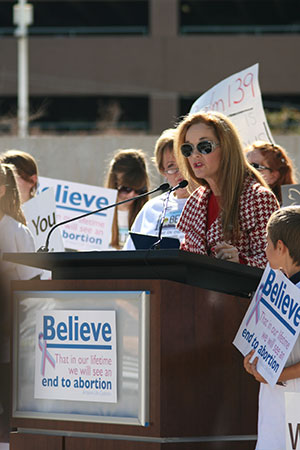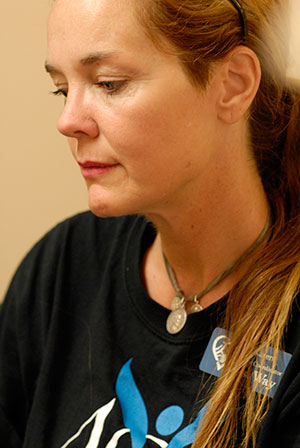
There are plenty of things Karen Williams will never forget about her abortion.
She remembers the abortionist’s eyes. It’s all she could see of him because his face was covered by his surgical mask.


Workers at the abortion clinic told her she was pregnant in a hallway, while she was standing up. She doesn’t know why they didn’t bother to have her sit down or give her any privacy.
“It was cold,” Williams said. “It was a transaction.”
She remembers the 9-and-a-half week ultrasound — the one time she got to see her son alive.
The sound of the vacuum used to remove her child, she remembers that. She saw the blood drained from inside of her womb through a clear tube and thought, “That’s my baby.”
And she remembers being shuffled off after the abortion, the “procedure,” as those who work at the abortion clinic called it. They put her in a room with others who’d had abortions. They all stared at each others’ feet. None of the clinic staff looked her in the eye, either.
“It’s shame,” Williams said of the lack of eye contact. “I didn’t tell anyone.”
It was fall 1986, around Halloween, when Williams found out she was pregnant. She was in her early 20s and involved in a sexual relationship with her boyfriend.
She knew her family wouldn’t understand. She and her boyfriend resolved to borrow money from a family friend — a Catholic — to get the abortion. There weren’t home pregnancy tests at the time, and when the clinic worker told her she was pregnant, her knees buckled.
“I can’t be pregnant,” she cried. Williams was led into an office where a young, attractive woman sat her down to talk about having an abortion. The woman had pictures of her family on display. “It’s going to be over in a few minutes and this problem will be gone,” the woman said. The woman explained that she’d had several abortions herself, but now enjoyed a happy family life.
When it was over, they put her on birth control pills without counseling, without consulting her boyfriend. Adoption was never mentioned.
“My child would have been born in July,” Williams said. “He would be 26.”
After the abortion
Williams turned to alcohol to numb the guilt that overcame her after the abortion. Substance abuse is common after an abortion, according to Nikki Westby, a psychologist who does post abortive counseling.
“There’s often grief around the anniversary of when the baby would have been born,” Westby said. Women also experience anxiety, contemplate suicide, and sometimes find it difficult to bond with their children that were born before or after the abortion. Women will suffer outbursts of crying.
Nearly 10 years after her abortion, Williams became Catholic.
“My first confession was my abortion,” she said. “I never felt judged by the Catholic Church.”


And while she acknowledged the mercy manifest in the confessional, she felt she had to do more.
Williams signed up for the respect life committee at her parish and then began “sidewalk counseling” with her friend Leann Able, offering advice to women entering abortion clinics.
“We tried to provide a speed bump for people” considering an abortion, she said. She spoke during 40 Days for Life campaigns and volunteered as a peer counselor at 1st Way Crisis Pregnancy Center.
“It’s so important to keep counseling,” said Christine Accurso, executive director of 1st Way. Even when women choose to abort their child after counseling at the crisis pregnancy center, they are still welcome to come back. “You may be saving the life of the second child. We do not judge a woman when she walks in the door or when she walks out.”
Nearly half of U.S. abortions are performed on women who have had a previous abortion, according to a 2006 Guttmacher Institute study.
“It’s very important that we don’t have judgment,” Accurso said. She shared how recently a woman walked into 1st Way and said, “I just killed my baby.” Accurso and the woman spent more than two hours counseling after that.
“What these women go through is so layered,” she said. “Her wounds were so fresh, she just had to get it out.”
Williams, who has children ages 16 and 21, can identify with that. Eventually, she felt called to share her story of abortion and healing with others in a more public forum.
“I was so desperate for healing that my fear collapsed,” Williams said.
She didn’t want to do that near where she lived in Phoenix, but figured Chandler would be far enough away. So she prayed for that. Instead, Williams received a call from Deacon Tom Fox, who heads up a pro-life group at St. Philip the Apostle in Payson.
Deacon Fox had heard praises for Williams as a pro-life speaker with 40 Days for Life. So he asked her to come up and speak to a group of about 15 people.
“She was sharing about aspects of the pro-life movement, but she was stretching it on,” Deacon Fox said. “Then she decided to share the story of her abortion and what led to it. We were spellbound, mesmerized.”
The group still talks about the day Williams shared her story.
“We hear about these things, but it’s always far away from us,” Deacon Fox said. “Here, maybe eight feet away from us, she described the agony of going through this. We were drawn to her and sympathized with her.”
The group heard her story of repentance and how she came to be an advocate for life.
“That was a turning point for me,” Williams said. “This was God using the likes of me to maybe save a life.”
She signed up for Silent No More, a network of Christians who work together to make others aware of the pain cause by abortion.
“What I was recognizing in Silent No More is that it was important for people to share their stories,” she said, adding, “but they have to be ready for it.”
‘Mantle of Hope’


In 2010, Williams went on a Rachel’s Vineyard retreat, which helps men and women cope with the emotional and spiritual pain caused by abortion. While she found the weekend healing, she felt called to establish an ongoing support group that would meet weekly.
“You can’t have true healing in this area without spiritual healing,” she said. Williams said healing from an abortion means mental, spiritual and physical recovery. To facilitate that kind of healing, Williams established “Mantle of Hope,” a reference to the Blessed Mother.
“Our Lady is crucial to the healing process,” she said. “She brought hope into the world.”
That spiritual dimension, recognizing God’s endless mercy and Christ’s victory on the cross, was key to Williams’ ongoing recovery.
“I was up on the cross taking the place of God,” Williams said, adding that she felt she had to punish herself. “I had to let myself off the hook, take myself down from the cross.”
Nikki Westby, who’s been involved with Rachel’s Vineyard as a counselor for nearly 15 years, said post-abortive women will often continue to be in abusive relationships because they feel they deserve it. “Some women feel they don’t deserve to have children again,” she said.
“It’s true that some women say their abortion didn’t affect them,” Westby said. “It can feel like, ‘My problem is gone.’ But it catches up with women over time. You can only repress an abortion for so long.”
It can take years and even decades for post-abortive women to confront their guilt and grieve their aborted children.
Mantle of Hope meets twice a month after the 9:15 a.m. Mass at St. Joan of Arc Parish. Meetings usually begin around 10:30 a.m. and are open to men and women — Catholic or not — who have suffered through an abortion.
The group works out of a manual put out by Bethesda Healing Ministries, which is based in Columbus, Ohio. Bishop Thomas J. Olmsted wrote the foreword to the manual.
“We want more healthy integral people that aren’t living in shame, but in the love that’s around them,” Williams said, paraphrasing the bishop. “Bishop Olmsted always has a special place in his heart for those of us that are post-abortive.”
Since it began in December of 2011, Mantle of Hope has helped many post-abortive men and women heal “from the inside out,” Williams said.
“We do much more effective work when we speak with love,” Williams said. “The healthier the post-abortive community is, the more effective the message will be.”
She’s discovered this healing herself. The abortionist who spoke to her through the veil of his surgical mask, she forgave him. The well-dressed woman who told her abortion was a normal part of planning your family, she forgave her.
When she discovered she was pregnant back in 1987, her boyfriend gave her what seemed to be the perfect response: “Whatever you want to do, Karen, I’ll support you. But it’s your choice.”
Williams came to discover this as her boyfriend sidestepping responsibility for his unborn son. He took no ownership of the decision to end his child’s life.
So she had to forgive him, too. And she did. She forgave her family members, from whom she felt no support. And she forgave herself.
“When we have an abortion, it’s a death to be grieved,” Williams said. “It’s a person to be labored and delivered in our heart.”
Through post-abortive counseling, she’s come to properly grieve her son. Part of that process included giving him a name: Michael.
“Many post-abortive women don’t see themselves as parents, but they are,” said Williams, who is studying to be a counselor herself. Post-abortive groups like Mantle of Hope help mothers “give birth to the life inside us.”
“Our aborted children are part of our community,” Williams said, noting memorial gardens for the unborn in the Diocese of Phoenix. “They’re part of the communion of saints. They’re martyrs, really.”
Williams now works at 1st Way Crisis Pregnancy Center. And, like the attractive professional woman she met at the abortion clinic, she’s offering advice to women with unexpected pregnancies.
But unlike that woman, Williams listens to these pregnant mothers with loving eyes and tells them the truth about the beauty dwelling within their wombs.
Rachel’s Vineyard
Weekend retreats throughout the year as well as a 15-week post-retreat support group.
Info: (480) 329-6795, Karenord.rv@gmail.com
Upcoming retreat: Nov. 22-24
Tears Speak…But Spirits Soar
An ongoing support group for post-abortive women that fosters healing through sharing in a confidential, safe environment. Meetings at Mount Claret Retreat Center.
Info: (480) 838-7474
Mantle of Hope
A post-abortive support group for men and women that meets twice monthly to experience healing through fellowship, prayer and the sacraments.
Info: (602) 791-7189





